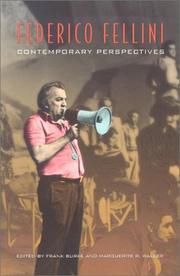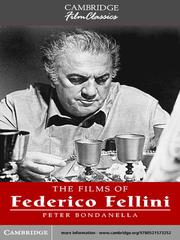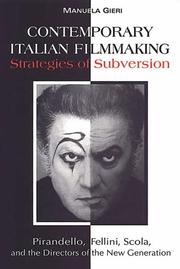| Listing 1 - 10 of 10 |
Sort by
|
Book
ISBN: 9786556301792 Year: 2020 Publisher: Salvador, Bahia : SciELO - EDUFBA,
Abstract | Keywords | Export | Availability | Bookmark
 Loading...
Loading...Choose an application
- Reference Manager
- EndNote
- RefWorks (Direct export to RefWorks)
Book
ISBN: 1782382313 1782382305 0857459716 Year: 2013 Publisher: New York : Berghahn Books,
Abstract | Keywords | Export | Availability | Bookmark
 Loading...
Loading...Choose an application
- Reference Manager
- EndNote
- RefWorks (Direct export to RefWorks)
Federico Fellini's script for perhaps the most famous unmade film in Italian cinema, The Journey of G. Mastorna (1965/6), is published here for the first time in full English translation. It offers the reader a remarkable insight into Fellini's creative process and his fascination with human mortality and the great mystery of death. Written in collaboration with Dino Buzzati, Brunello Rondi, and Bernardino Zapponi, the project was ultimately abandoned for a number of reasons, including Fellini's near death, although it continued to inhabit his creative imagination and the landscape
Motion pictures, Italian. --- Fellini, Federico --- Criticism and interpretation.
Book
ISBN: 1782388206 Year: 2015 Publisher: New York ; Oxford, [England] : Berghahn,
Abstract | Keywords | Export | Availability | Bookmark
 Loading...
Loading...Choose an application
- Reference Manager
- EndNote
- RefWorks (Direct export to RefWorks)
Federico Fellini is often considered a disengaged filmmaker, interested in self-referential dreams and grotesquerie rather than contemporary politics. This book challenges that myth by examining the filmmaker’s reception in Italy, and by exploring his films in the context of significant political debates. By conceiving Fellini’s cinema as an individual expression of the nation’s “mythical biography,” the director’s most celebrated themes and images — a nostalgia for childhood, unattainable female figures, fantasy, the circus, carnival — become symbols of Italy’s traumatic modernity and perpetual adolescence.
Fellini, Federico --- Political and social views. --- Italy --- In motion pictures.
Film

ISBN: 9789056752804 9056752804 Publisher: Homescreen
Abstract | Keywords | Export | Availability | Bookmark
 Loading...
Loading...Choose an application
- Reference Manager
- EndNote
- RefWorks (Direct export to RefWorks)
Fellini, Federico --- 791.43.07 --- Film ; F. Fellini ; Otto e mezzo ; 1963 --- Fellini, Federico 1920-1993 (°Rimini, Italië) --- DVD's --- Filmregisseurs, acteurs, filmografen --- films --- DVD

ISBN: 0802076475 0802006965 9786612003172 1282003178 1442674830 9781442674837 9781282003170 9780802006967 9780802076472 Year: 2002 Publisher: Toronto
Abstract | Keywords | Export | Availability | Bookmark
 Loading...
Loading...Choose an application
- Reference Manager
- EndNote
- RefWorks (Direct export to RefWorks)
Federico Fellini remains the best known of the postwar Italian directors. This collection of essays brings Fellini criticism up to date, employing a range of recent critical filters, including semiotic, psychoanalytical, feminist and deconstructionist. Accordingly, a number of important themes arise - the reception of fascism, the crisis of the subject, the question of agency, homo-eroticism, feminism, and constructions of gender. Since the early 1970s, a slide in critical and theoretical attention to Fellini's work has corresponded with an assumption that his films are self-indulgent and lacking in political value. This volume moves the discussion towards a politics of signification, contending that Fellini's evolving self-reflexivity is not mere solipsism but rather a critique of both aesthetics and signification. The essays presented here are almost all new - the two exceptions being important signifiers in Fellini studies. The first, Frank Burke's "Federico Fellini: Reality/Representation/Signification" laid the foundation in the late 1980s for considering Fellini's work in the light of postmodernism. The second, Marguerite Waller's "Whose Dolce Vita is this Anyway?: The Language of Fellini's Cinema" (1990), provides a contemporary re-reading of Fellini's most successful film. This lively and ambitious collection brings a new critical language to bear on Fellini's films, offering fresh insights into their underlying issues and meaning. In bringing Fellini criticism up to date, it will have a significant impact on film studies, reclaiming this important director for a contemporary audience

ISBN: 1107113571 1280417072 0511175957 1139145754 0511065728 0511059418 0511323549 0511613342 0511067852 9780511065729 9780511059414 9780511067853 9786610417070 6610417075 0521573254 9780521573252 0521575737 9780521575737 9780511613340 0511090269 9781107113572 9781280417078 9780511175954 9781139145756 9780511323546 Year: 2002 Publisher: Cambridge Cambridge University Press
Abstract | Keywords | Export | Availability | Bookmark
 Loading...
Loading...Choose an application
- Reference Manager
- EndNote
- RefWorks (Direct export to RefWorks)
The Films of Federico Fellini examines the career of one of Italy's most renowned filmmakers through close analysis of five masterpieces that span his career: La Strada, La Dolce Vita, 8 1/2, Amarcord and Interview. Providing an overview of Fellini's early career as a cartoonist and scriptwriter for neorealist directors such as Roberto Rossellini, this study traces the development of Fellini's unique and personal cinematic vision as it transcends Italian neorealism. Rejecting an overtly ideological approach to Fellini's cinema, Bondanella emphasizes the director's interest in fantasy, the irrational and individualism.
Motion pictures --- Motion picture industry --- Biography --- Employees --- Fellini, Federico --- Fellini, Frederico --- Fellini, F. --- Felini, Federiḳo --- פליני, פדריקו --- Fellas, --- Criticism and interpretation.
Book
ISBN: 9782753504905 2753504903 2821818068 2753526885 Year: 2007 Volume: *42 Publisher: Rennes Presses universitaires de Rennes
Abstract | Keywords | Export | Availability | Bookmark
 Loading...
Loading...Choose an application
- Reference Manager
- EndNote
- RefWorks (Direct export to RefWorks)
L’acteur fut longtemps un mal-aimé des discours savants sur le cinéma : sa présence semblait un matériau précaire, fuyant, offrant peu de prise à l’analyse et à la théorie. Cependant les temps changent et, grâce aux efforts de nombreux critiques et universitaires, l’acteur s’est imposé au cours des dernières décennies comme objet légitime d’étude et de recherche. C’est de cette évolution qu’a voulu témoigner le colloque « L’acteur de cinéma, approches pluridisciplinaires », organisé à l’automne 2005 au Centre Culturel International de Cerisy-la-Salle, et dont est né le présent volume. Il se compose d’études riches et diverses qui relèvent non seulement de l’histoire et de l’esthétique du cinéma mais aussi de la sociologie, de l’économie, de l’anthropologie, approches multiples qui assurent la vitalité des études cinématographiques contemporaines. On trouvera ici les grands motifs d’une pensée de l’acteur : héritages du théâtre, émotion et distanciation, mise en scène et mise en geste, analyse de la star comme signe culturel. On suivra les aventures du casting ou des retakes, une Dame de Shanghai pouvant en cacher une autre. On verra ce qu’apporte à l’écran français des années trente l’exotisme familier du jeu méridional, et comment nos acteurs nationaux voyagent d’une comédie bien française à son remake hollywoodien. On saura encore ce qui fait la valeur des stars, de l’entreprise Cruise à l’auteur Eastwood, et pourquoi les acteurs sont, autant en terme d’art que d’industrie, les forces vives du cinéma.
Motion picture actors and actresses --- Acteurs et actrices de cinéma --- Congresses --- Congrès --- Acting --- Actors --- film --- 791.41 --- 791.472 AAAA --- Deneuve Catherine --- Signoret Simone --- Darrieux Danielle --- Cruise Tom --- Eastwood Clint --- Reagan Ronald --- Cagney James --- Fellini Federico --- The lady of Shanghai --- Welles Orson --- Dogma --- Kammerspiel --- Delsarte François --- acteurs --- actrices --- filmtheorie --- Music, Dance, Drama & Film --- Film --- Acteurs et actrices de cinéma --- Congrès --- 791.472 --- CDL --- Acting - Congresses --- Actors - Congresses --- Hollywood --- kammerspiel --- star --- cinéma --- acteur --- Acteurs de cinéma --- Histoire

ISBN: 0802069797 080200556X 9786612002991 1282002996 1442673354 9781442673359 9781282002999 9780802005564 9780802069795 Year: 1996 Volume: *2 Publisher: Toronto
Abstract | Keywords | Export | Availability | Bookmark
 Loading...
Loading...Choose an application
- Reference Manager
- EndNote
- RefWorks (Direct export to RefWorks)
Contemporary Italian Filmmaking is an innovative critique of Italian filmmaking in the aftermath of World War II - as it moves beyond traditional categories such as genre film and auteur cinema. Manuela Gieri demonstrates that Luigi Pirandello's revolutionary concept of humour was integral to the development of a counter-tradition in Italian filmmaking that she defines 'humoristic'. She delineates a 'Pirandellian genealogy' in Italian cinema, literature, and culture through her examination of the works of Federico Fellini, Ettore Scola, and many directors of the 'new generation, ' such as Nanni Moretti, Gabriele Salvatores, Maurizio Nichetti, and Giuseppe Tornatore. A celebrated figure of the theatrical world, Luigi Pirandello (1867-1936) is little known beyond Italy for his critical and theoretical writings on cinema and for his screenplays. Gieri brings to her reading of Pirandello's work the critical parameters offered by psychoanalysis, poststructuralism, and postmodernism to develop a syncretic and transcultural vision of the history of Italian cinema. She identifies two fundamental trends of development in this tradition: the 'melodramatic imagination' and the 'humoristic, ' or comic, imagination. With her focus on the humoristic imagination, Gieri describes a 'Pirandellian mode' derived from his revolutionary utterances on the cinema and narrative, and specifically, from his essay on humour, L'umorismo (On Humour, 1908). She traces a history of the Pirandellian mode in cinema and investigates its characteristics, demonstrating the original nature of Italian filmmaking that is particularly indebted to Pirandello's interpretation of humour.
Motion pictures --- Fellini, Federico. --- Pirandello, Luigi, --- Scola, Ettore, --- Bīrāndallū, Luwījī, --- Pirandello, Luidzhi, --- Pirandélo, Luwiji, --- פיראנדלו, לואיג׳י, --- פירנדלו, לואיג׳י --- פירנדלו, לואיג׳י, --- بيراندللو، لويجي، --- Fellini, Frederico --- Fellini, F. --- Felini, Federiḳo --- פליני, פדריקו --- Italy --- History --- Pirandello, Luigi --- Influence --- Motion pictures - Italy. --- Пиранделло, Луиджи, --- Fellas, --- Pīrāndillū, Lūʼījī, --- پىراندللو، لوئيجى --- Fellini, Federico --- Italien --- Italy. --- Italia --- Italian Republic --- Italianska republika --- Italʹi͡anskai͡a Rėspublika --- Italie --- Italii͡ --- Italii͡a Respublikasi --- Italiĭsʹka Respublika --- Itālija --- Itālijas Republika --- Italijos Respublika --- Italikē Dēmokratia --- Īṭāliy --- Italiya Respublikasi --- It'allia --- It'allia Konghwaguk --- İtalya --- İtalya Cumhuriyeti --- Iṭalyah --- Iṭalye --- Itaria --- Itaria Kyōwakoku --- Jumhūrīyah al-Īṭālīyah --- Kgl. Italienische Regierung --- Königliche Italienische Regierung --- Laško --- Lýðveldið Ítalía --- Olasz Köztársaság --- Olaszország --- Regno d'Italia --- Repubblica italiana --- Republiḳah ha-Iṭalḳit --- Włochy --- Yidali --- Yidali Gongheguo --- Königreich Italien --- Repubblica Italiana --- Olaszorszaǵ --- Olasz Koz̈taŕsasaǵ --- Italienische Republik --- République Italienne --- Yidali-gongheguo --- Italiener --- Königreich Sardinien --- Republik von Salò --- 17.03.1861 --- -Motion pictures
Book
ISBN: 1442669586 9781442669581 9781442669598 1442669594 9781442645165 1442645164 9781442613270 1442613270 Year: 2013 Publisher: Toronto
Abstract | Keywords | Export | Availability | Bookmark
 Loading...
Loading...Choose an application
- Reference Manager
- EndNote
- RefWorks (Direct export to RefWorks)
"Federico Fellini professed a desire to create "an entire film made of immobile pictures." In this study, Hava Aldouby uses this quotation as a launching point to analyze Fellini's films as sequences of "pictures" that draw extensively on art history, and particularly painting, as a reservoir of visual imagery. Aldouby employs an innovative pictorial approach that allows her to uncover a wealth of visual evocations overlooked by Fellini scholars over the years. Federico Fellini: Painting in Film, Painting on Film sheds light on the intertextual links between Fellini's films and the works of various artists, from Velazquez to Francis Bacon, by identifying references to specific paintings in his films. Using new archival evidence from Fellini's private library, brought to light for the first time here, Aldouby draws out Fellini's in-depth knowledge of art history and his systematic employment of art-historical allusions."--Publisher's description
Motion picture producers and directors --- Art in motion pictures. --- Art in moving-pictures --- Motion pictures --- Directors, Motion picture --- Film directors --- Film producers --- Filmmakers --- Motion picture directors --- Moviemakers --- Moving-picture producers and directors --- Producers, Motion picture --- Persons --- Fellini, Federico --- Fellini, Frederico --- Fellini, F. --- Felini, Federiḳo --- פליני, פדריקו --- Fellas, --- Criticism and interpretation. --- Italy. --- Italia --- Italian Republic --- Italianska republika --- Italʹi͡anskai͡a Rėspublika --- Italie --- Italien --- Italii͡ --- Italii͡a Respublikasi --- Italiĭsʹka Respublika --- Itālija --- Itālijas Republika --- Italijos Respublika --- Italikē Dēmokratia --- Īṭāliy --- Italiya Respublikasi --- It'allia --- It'allia Konghwaguk --- İtalya --- İtalya Cumhuriyeti --- Iṭalyah --- Iṭalye --- Itaria --- Itaria Kyōwakoku --- Jumhūrīyah al-Īṭālīyah --- Kgl. Italienische Regierung --- Königliche Italienische Regierung --- Laško --- Lýðveldið Ítalía --- Olasz Köztársaság --- Olaszország --- Regno d'Italia --- Repubblica italiana --- Republiḳah ha-Iṭalḳit --- Włochy --- Yidali --- Yidali Gongheguo --- Italy
Book
ISBN: 1442616725 9781442616721 9781442644991 1442644990 9781442612921 1442612924 1442616733 Year: 2014 Publisher: Toronto
Abstract | Keywords | Export | Availability | Bookmark
 Loading...
Loading...Choose an application
- Reference Manager
- EndNote
- RefWorks (Direct export to RefWorks)
Annotation
Motion picture producers and directors --- Motion pictures --- Cinema --- Feature films --- Films --- Movies --- Moving-pictures --- Audio-visual materials --- Mass media --- Performing arts --- Directors, Motion picture --- Film directors --- Film producers --- Filmmakers --- Motion picture directors --- Moviemakers --- Moving-picture producers and directors --- Producers, Motion picture --- Persons --- Criticism and interpretation. --- History and criticism. --- History and criticism --- Fellini, Federico --- Fellini, Frederico --- Fellini, F. --- Felini, Federiḳo --- פליני, פדריקו --- Fellas, --- Friends and associates. --- Italy. --- Italia --- Italian Republic --- Italianska republika --- Italʹi͡anskai͡a Rėspublika --- Italie --- Italien --- Italii͡ --- Italii͡a Respublikasi --- Italiĭsʹka Respublika --- Itālija --- Itālijas Republika --- Italijos Respublika --- Italikē Dēmokratia --- Īṭāliy --- Italiya Respublikasi --- It'allia --- It'allia Konghwaguk --- İtalya --- İtalya Cumhuriyeti --- Iṭalyah --- Iṭalye --- Itaria --- Itaria Kyōwakoku --- Jumhūrīyah al-Īṭālīyah --- Kgl. Italienische Regierung --- Königliche Italienische Regierung --- Laško --- Lýðveldið Ítalía --- Olasz Köztársaság --- Olaszország --- Regno d'Italia --- Repubblica italiana --- Republiḳah ha-Iṭalḳit --- Włochy --- Yidali --- Yidali Gongheguo --- Italy
| Listing 1 - 10 of 10 |
Sort by
|

 Search
Search Feedback
Feedback About UniCat
About UniCat  Help
Help News
News